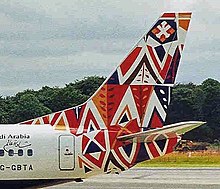Shadia Alem
Shadia Alem | |
|---|---|
شادية عالم | |
| Born | 1960 (age 63–64) Mecca, Saudi Arabia |
| Other names | Shādiyah 'Ālim |
| Alma mater | King Abdulaziz University |
| Known for | Sculpture, installation art, painting |
| Notable work | The Black Arch - Venice Biennale |
| Website | https://www.shadiaalem.com/ |
Shadia Alem (Arabic: شادية عالم, romanized: Shādiyah 'Ālim; born in Mecca) is a Saudi Arabian visual artist. She is known for her sculpture, installation art, and painting. She lives and works between Paris and Jeddah.[1]
Early life
[edit]Shadia Alem was born in Makkah.[2] Her childhood was spent in Taif, where she reportedly painted on doors from a young age.[3] Her father was a calligrapher and her mother embroidered.[4]
Education
[edit]Alem graduated with a BA in Art and English Literature from King Abdulaziz University. [5]
Career
[edit]
Since 1985 Alem's work has been exhibited nationally in Saudi Arabia and internationally.[2] Some works are a commentary of the lives of women in Saudi Arabia, using form to demonstrate the anxiety that women may live under.[6]
Alem's work, Youm al-Suq, was selected by British Airways to appear on the livery of its aircraft in 1998.[7][8] Her 2007 retrospective exhibition at Albareh Gallery demonstrated the development of her work from portraiture, to landscape, to photography.[9] She has also exhibited at the Kunstmuseum in Bonn,[10] at Amum in Tennessee,[11] in Istanbul as part of its 2010 Capital of Culture programme,[12] and at the 6th Berlin Biennale.[13]
Venice Biennale
[edit]In 2011, Saudi Arabia entered the Venice Biennale for the first time with Alem as the country's representative.[14][15][16] Her work, entitled The Black Arch, which draws on folklore, Islam and medieval travel narratives.[17] The work was made of up of a dark cube suspended on its point over a sea of iridescent spheres.[18] Visitors were encouraged to move around the work and the sphere represented travellers of all kinds.[19] It covered an area of 350 square metres; its scale as an installation has been interpreted as a challenge to spatial order.[20] The colour black was also key to the installation: as the colour of Ka'aba cloth, the colour of the silhouettes of veiled women and of the black stone.[4]
In the same year, Alem was one of the artists chosen to feature in the British Museum's exhibition Hajj.[21][22] However, 2011 was not just a year of achievement - it is also the year their mother died, 15 years worth of work was lost in a flood in Jeddah and computer failure lost five further projects.[4]
Women and art in Saudi Arabia
[edit]In 2011, Shadia Alem and her sister, writer, were featured in Vogue Italia, discussing their work and the role of women in Saudi Arabia.[23] While Alem tackles gender issues through her work, her sister sees her writing as genderless.[24] In Alem's work Negative No More, the pre-and-misconceptions of Saudi women are commented on.[25] This installation consisted of 5000 photographic negatives, none of which feature women, to draw attention to the fact that women have been absent from Saudi Arabian political history.[26]
References
[edit]- ^ "Shadia Alem | Biography | Athr Gallery". www.athrart.com. Retrieved 2020-03-26.
- ^ a b "Edge Of Arabia - Contemporary art and creative movements from the Arab World". edgeofarabia.com. Retrieved 2020-03-26.
- ^ "Shadia Alem. Greenbox Dictionary of Saudi Arabian Artists". www.greenboxmuseum.com. Retrieved 2020-03-26.
- ^ a b c "Collecting special: Pilgrims' progress". www.ft.com. Retrieved 2020-03-26.
- ^ "Shadia Alem". ATHART. Retrieved 2020-04-02.
- ^ Bates, Linda. (1998). Transitions : an interactive reading, writing, and grammar text (2nd ed.). Cambridge, UK: Cambridge University Press. p. 244. ISBN 0-521-65782-2. OCLC 42457877.
- ^ "Youm al-Suq - Shadia Alem". 2019-01-31. Archived from the original on 2019-01-31. Retrieved 2020-03-26.
- ^ Saudi Arabia: The Monthly Newsletter of the Royal Embassy of Saudi Arabia. Information Office, Royal Embassy of Saudi Arabia. 1998.
- ^ "Review: Shadia Alem – Albareh gallery : Gulf Weekly Online". www.gulfweekly.com. Retrieved 2020-03-26.
- ^ "Shadia Alem. Languages of the Desert". universes.art. Retrieved 2020-03-26.
- ^ "Edge Of Arabia - Contemporary art and creative movements from the Arab World". edgeofarabia.com. Retrieved 2020-03-26.
- ^ "Edge Of Arabia - Contemporary art and creative movements from the Arab World". edgeofarabia.com. Retrieved 2020-03-26.
- ^ "Edge Of Arabia - Contemporary art and creative movements from the Arab World". edgeofarabia.com. Retrieved 2020-03-26.
- ^ Cumming, Laura (2011-06-04). "The 54th Venice biennale – review". The Observer. ISSN 0029-7712. Retrieved 2020-03-26.
- ^ Magazine, Wallpaper* (2011-06-07). "Venice Art Biennale 2011". Wallpaper*. Retrieved 2020-03-26.
- ^ Bharadwaj, Vinita (2012-01-18). "Contemporary Artists Rock the Boat Gently in Saudi Arabia". The New York Times. ISSN 0362-4331. Retrieved 2020-03-26.
- ^ Dazed (2011-06-08). "Venice Biennale 2011: Saudi Arabia's The Black Arch". Dazed. Retrieved 2020-03-26.
- ^ Smith, Sylvia (2011-09-07). "Arab art at Venice Biennale". BBC News. Retrieved 2020-03-26.
- ^ Slabbert, Barend; Jordaan, June (2016). "Sustainable ARTiculation: Adapting significant interiors to contemporary art galleries". International Education for Sustainable Development Alliance - Conference Proposal.
- ^ Al-Sadu as a Way of Understanding the Sociospatial Practices of Contemporary Art by Saudi Women (Thesis) Khulod Mohammed Albugami http://www.open-access.bcu.ac.uk/8696/1/KA-final%20thesis_2019.pdf
- ^ Butt, Riazat (2011-07-19). "British Museum to stage exhibition dedicated to hajj pilgrimage". The Guardian. ISSN 0261-3077. Retrieved 2020-03-26.
- ^ "Museum to stage Hajj exhibition". BBC News. 2011-07-20. Retrieved 2020-03-26.
- ^ "Shadia and Raja Alem - Vogue.it". www.vogue.it (in Italian). Retrieved 2020-03-26.
- ^ Demerdash, Nancy (2017-08-07). "Of "Gray Lists" and Whitewash: An Aesthetics of (Self-)Censorship and Circumvention in the GCC Countries". Journal of Arabian Studies. 7 (sup1): 28–48. doi:10.1080/21534764.2017.1352162. ISSN 2153-4764. S2CID 148690561.
- ^ Kattan, Lina M. (2015). The conflicted living beings: The performative aspect of female bodies' representations in Saudi painting and photography (PhD thesis).
- ^ Al-Senan, Maha Abdullah (2015). "CONSIDERATIONS ON SOCIETY THROUGH SAUDI WOMEN'S ART". International Journal of Development Research. 5 (5): 3.
